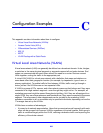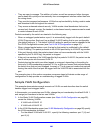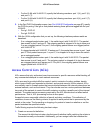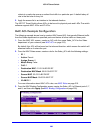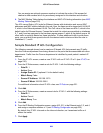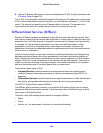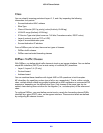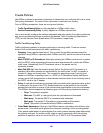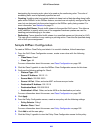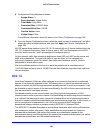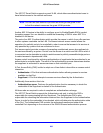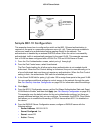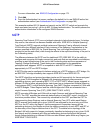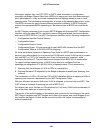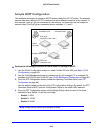
292
XS712T Smart Switch
Create Policies
Use DiffServ policies to associate a collection of classes that you configure with one or more
QoS policy statements. The result of this association is referred to as a policy.
From a DiffServ perspective, there are two types of policies:
• Traffic Conditioning Policy. a policy applied to a DiffServ traffic class
• Service Provisioning Policy. a policy applied to a DiffServ service level
You must manually configure the various statements and rules used in the traffic conditioning
and service provisioning policies to achieve the desired Traffic Conditioning Specification
(TCS) and the Service Level Specification (SLS) operation, respectively.
Traffic Conditioning Policy
Traffic conditioning pertains to actions performed on incoming traffic. There are several
distinct QoS actions associated with traffic conditioning:
• Dropping. Drop a packet upon arrival. This is useful for emulating access control list
operation using DiffServ, especially when DiffServ and ACL cannot co-exist on the same
interface.
• Mark IP DSCP or IP Precedence. Marking/re-marking the DiffServ code point in a packet
with the DSCP value representing the service level associated with a particular DiffServ
traffic class. Alternatively, the IP Precedence value of the packet can be
marked/re-marked.
• Mark CoS (802.1p). Sets the three-bit priority field in the first/only 802.1p header to a
specified value when packets are transmitted for the traffic class. An 802.1p header is
inserted if it does not already exist. This is useful for assigning a layer 2 priority level
based on a DiffServ forwarding class (i.e., DSCP or IP Precedence value) definition to
convey some QoS characteristics to downstream switches which do not routinely look at
the DSCP value in the IP header.
• Policy. A method of constraining incoming traffic associated with a particular class so that
it conforms to the terms of the TCS. Special treatment can be applied to out-of-profile
packets that are either in excess of the conformance specification or are non-conformant.
The DiffServ feature supports the following types of traffic policing treatments (actions):
- Drop. The packet is dropped
- Mark cos. The 802.1p user priority bits are (re)marked and forwarded
- Mark dscp. The packet DSCP is (re)marked and forwarded
- Mark prec. The packet IP Precedence is (re)marked and forwarded
- Send. The packet is forwarded without DiffServ modification
• Color Mode Awareness. Policing in the DiffServ feature uses either color blind or color
aware mode. Color blind mode ignores the coloration (marking) of the incoming packet.
Color aware mode takes into consideration the current packet marking when determining
the policing outcome. An auxiliary traffic class is used in conjunction with the policing
definition to specify a value for one of the 802.1p, IP DSCP, or IP Precedence fields




